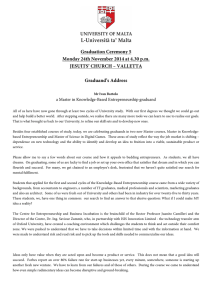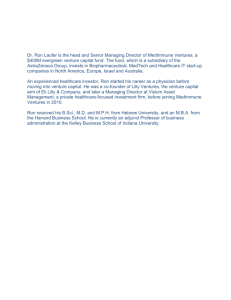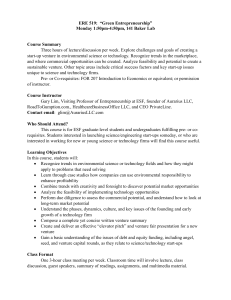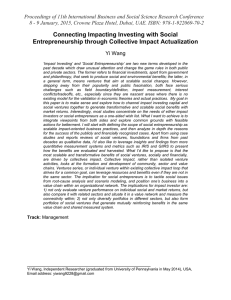MARYLAND U N I V E RS I T...
advertisement
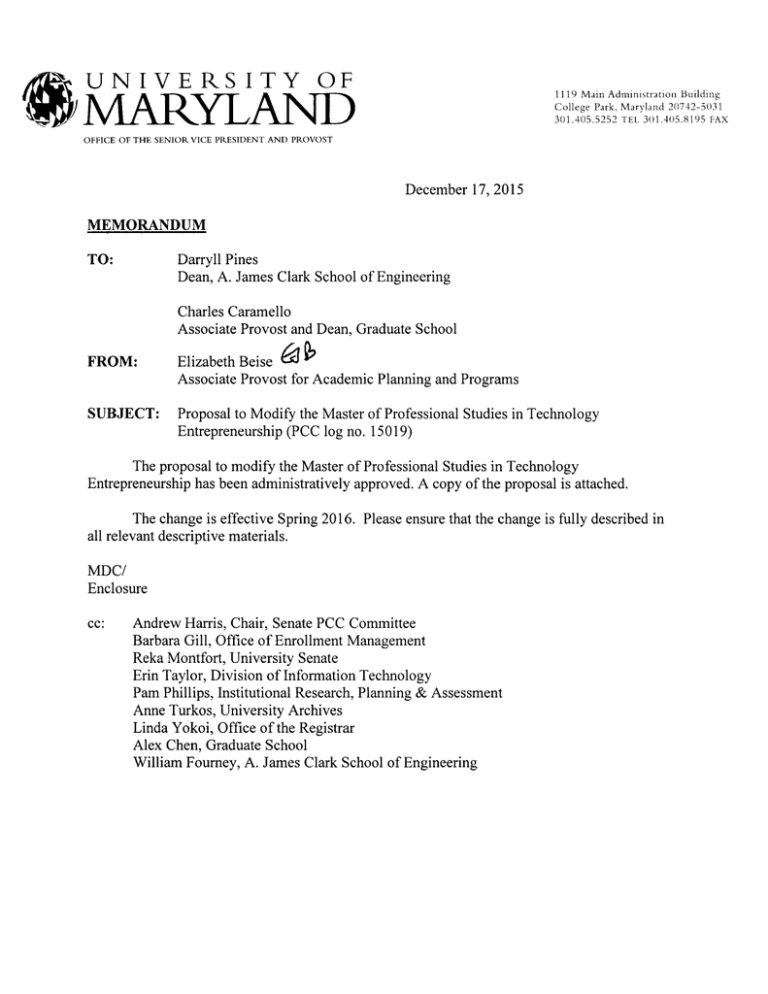
U N I V E RS I T Y OF
1119 M a i n A d m i n i s t r a t i o n B u i l d i n g
College Park, M a r y l a n d 20742-5031
301.405.5252 T E L 301.405.8195 F A X
MARYLAND
OFFICE OF T H E SENIOR VICE PRESIDENT AND PROVOST
December 17,2015
MEMORANDUM
TO:
Darryll Pines
Dean, A. James Clark School of Engineering
Charles Caramello
Associate Provost and Dean, Graduate School
FROM:
Elizabeth Beise
Associate Provost for Academic Planning and Programs
SUBJECT:
Proposal to Modify the Master of Professional Studies in Technology
Entrepreneurship (PCC log no. 15019)
The proposal to modify the Master of Professional Studies in Technology
Entrepreneurship has been administratively approved. A copy of the proposal is attached.
The change is effective Spring 2016. Please ensure that the change is fully described in
all relevant descriptive materials.
MDC/
Enclosure
cc:
Andrew Harris, Chair, Senate PCC Committee
Barbara Gill, Office of Enrollment Management
Reka Montfort, University Senate
Erin Taylor, Division of Information Technology
Pam Phillips, Institutional Research, Planning & Assessment
Anne Turkos, University Archives
Linda Yokoi, Office of the Registrar
Alex Chen, Graduate School
William Fourney, A. James Clark School of Engineering
THE
UNIVERSITY O F MARYLAND. C:0LLE(;E
PROGRAM/CURRICULUM/UNIT
Plc'fise email the res ofllic proposa! as an MSWonJ
attuchmeni
PARK
PROPOSAL
PCC LOG NO.
I'k'iiii.- .Hihmu ilic i i v n i lu Ihc O f l k v o i ' i h i .•\>s{>ciaK' PniviKi lor ,\c:kioiiiif I and !'fogtii^i^. H I ' i Main Admitiisiration finiiding, Campus.
College^Scliool: A. James < Mark Stiujoi of Lngint'cring
Please also add Collcgc/Scliool Unit Codc4"ir.st 8 digits: 012(B2««
Departoient/I^rogrum; Msiryland 1 echnohtgj Kiiterprise hiKtitutc (Mtech)
Please also add Deparnnent/Prograra Unit Code-Last 7 digits: 1J21 KM
Ty|H' of .•\ctioii (cho»se O I K ' ) :
X Ciirriculiiin change {including inlbrmal
-specializaiions)
Cunictikun uhaiige for an
I'rograin
New Proiessional Sftidies award iteration
.New Minor
keciiiesl create tin online version of an
ixisting progrant
Sujiimary of Proposed Action:
The A. .lames Clark Scliool of Engineering and Miecli are re(|uesting approval to add "ENES672:
Launching the 'I echnology Vciitinx''" to the eligible courses for the Master of Professional Studies in
Technology Einirepreneurship.
Depaitmenlal/Uiiit C:ontaci Person lor Proposal: \'. {.recn
j^grecn.w iintU.tdii
301-3I4-1-I50
Al'FRCVAl .SRiXA i I 'RhS !
Uepartnient ComnutlteCluur _ t ^C.
^i ' ^ ' ^ l : ^ ,
Dcpanmem Chan
3. Lol!ege.'.School Fit, Chair
l a l l l 2-0]$^
4. Demi
of the Graduate Schnol (if required
6. Chair. Se'<ate PCC
yi^vv^d^O^.^
7. University Senate Chair (if requii'ed i
8. Senior Vice Presidem and Provost
PCC PROPOSAL FOR CURRICULUM CHANGE
ADD COURSE ENES672 TO THE MASTER OF PROFESSIONAL STUDIES IN
TECHNOLOGY ENTREPRENEURSHIP
OVERVIEW OF MASTERS
The Master of Professional Studies in Technology Entrepreneurship aims to first equip students
with a conceptual understanding of the principles of effective new venture creation and launch.
The program then prepares its students to apply these insights and acquired competencies to
real-world entrepreneurial opportunities across five major stages of the innovation value chain
from idea generation to launching a technology-based venture. The curriculum maps to the
lifecycle of new venture creation and launch.
CURRENT CURRICULUM
The 30-credit, 10 course curriculum is completed on a 15-month schedule. Students enroll in
two 3-credit courses per 12-week term.
Table 1. Curriculum Overview (Existing)
Terml
• Innovative
Ideas &
Concept
Development
• Strategies for
Managing
Innovation
Term 2
•
•
Innovative
Thinking
Business
Modeling &
Customer
Validation
Tenn3
Term 4
Creative Design,
Prototyping, &
Testing
Market
Legal Aspects of
Entrepreneurship
Financial
Management &
New Venture
Financing
Development &
Commercialization
A detailed description of the courses is provided as table 2 on the next page.
Terms
• Corporate
Technology
Entrepreneurship
• Fxmdamentals of
Technology
Startup Ventures
o p p o r t u n i t y assessment a n d a n a l y s i s . L e a r n h o w to i d e n t i f y a n d
o n the c o n t e n t , m e t h o d s , a n d m o d e l s f o r n e w v e n t u r e
ENES662 I n n o v a t i v e Ideas a n d (Concept D e v e l o p m e n t : lH)ciises
t e c h n o l o g i c a l change; the w a y s t h a t f i r m s c
enhance f i r m p e r f o r m a n c e . U n d e r s t a n d the
i n n o v a t i v e l e a d e r s can use strategic m a n a g e
ENES663 Strategies f o r M a n a g i n g I n n o v a t
i n i r o v a t i o r t ; and
i n n o v a t i o n s ; the strategies tfiat f i r m s use to
P r o v i d e s f r a m e w o r k s f o r a n a l y z i n g key asp)
v e n t u r e s by f i r s t u n d e r s t a n d i n g t l i e i r p e r s o n a l self a n d d e c i s i o n m a k i n g factors. E x a m i n e h o w l o e v a l u a t e tlie o p p o r t u n i t i e s a n d
o n h o w t o create a n d d e l i v e r v a l u e for c i r s t o m e r s a n d h o w t o
ENES664 Btjsiness M o d e l i n g a n d C?ustc>rner V a l i d a t i o n . : Focuses
coiruiiunicaHon and teaming skills. Unlock
i d e n t i f y a n d e l i m i n a t e m e n t a l blocks, a n d e
p r o b l e m s o l v i n g s k i l l s . .Rediscover p e r s o n a l
ENES665 I n n o v a t i v e T h i n k i n g : I n t r o d u c e s
ENES667 M a r k e t D e v e l o p m e n t a n d C o m m e
potential, and explore w i n - w i n approaches
m o d e l s t h a t e n c o m p a s s tire p r o d u c t o r service, c u s t o m e r s , a n d
the e c o n o m i c e n g i n e t h a t w i l l d e l i v e r o n v e n t u r e objectives.
o p p o r t u n i t i e . s , u n d e r s t a n d c u s t o m e r prefere
techn(.>logy-based p r o d u c t s a n d services. I d
acceptance, a n d devise the apj.'sropriate g o i
an o r i e n t a t i o n t o k e y m a r k e t i n g concepts c r
services. E m p h a s i s is p l a c e d o n a n i n t e g r a t e d a n d
strategies.
s t u d e n t s to t r a n s i t i o n f r o m c r e a t i v e , i n n o v a t i v e , d e s i g n t h i n k i n g
i n t e r d i s c i p l i n a r y approach, t o e n g i n e e r i n g d e s i g n , c o n c u r r e r r t
i m p o r t a n t junctui:es a l o n g the p a t h t o success. S i g n i f i c a n t
a d d i e s s legal a n d husitiess issues f r o m i d e a t i o n to all of the
a n d l a u n c h a n e w v e n t u r e . E x p l o r e real w o r l d scenaricxs, a n d
n a v i g a t i n g f i n a n c i a l b a r r i e r s as w e l l as h o w
f i n a n c i a l c o n t r o l c>f y o u r e n t e r p r i s e . I n s i g l i
a c c o u n t i n g p r i n c i p l e s as w e l l as m e l l s o d s fr
financial f o u n d a t i o n for a new technology
P r o v i d e s the essential t o o l s a n d k n o w - h o w
a t t e n t i o n is p l a c e d o n n e w v e n t u r e f o r m a t i o n , i n t e l l e c t u a l
a m o u n t of c a p i t a l at tlie r i g h t t i m e f r o m t f i e
ENES670 F i n a n c i a l M a n a g e m e n t a n d .New
p r o p e r t y management:, a n d I'inancing a r r a j i g e m e n t s .
E x p l o r e s the processes a n d s k i l l s n e e d e d t o
E N E S 6 6 0 F u n d a m e n t a l s o f Tectrnology S t a
ENES669 Legal .Aspects of E n t r e p r e n e u r s h i p : H i g h l i g h t s the
ENES668 C'orporate .re(.:hnology Ent:repreneurshi[.i: P r o v i d e s
c r i t i c a l legal a n d business issues e n t r e p r e n e m s face as they b u i l d
business of n e w p r o d u c t d e v e l o p m e n t .
engineering, design for manufactirrtng, industrial design, and tlit
m e t h o d s t o p r o t o t y p i n g a n d concept t e s t i n g t h e i r p r o d u c t s a n d
IZNES666 C r e a t i v e D e s i g n , P r o t o t y p i n g , a n d T e s t i n g : Enables
s u s t a i n a b l y extract v a l u e f o r the v c n t i r r e . D e v e l o p business
in.dustries and. teaches s t u d e n t s h o w t o a p p l
the process o f f o r m u l a t i n g
challenges w i t h i n i t i d i i s t r i e s a n d m a r k e t s o f i n t e r e s t .
a n a l y z e e n t r e p r e n e u r i a l o p p o r t u n i t i e s for t e c h n o l o g y - b a s e d
Table 2. Course Descriptions
Term 1
Term 2
'T'erm 3
Temr 4
Term 5
i n s i g h t i n t o t h e i n n t ) v a t i o n process i n c o r p o r a t i o n s a n d th e
launching, and m a n a g i n g n e w companies.
l a u n c h a n d g r o w the v e n t u r e e f f e c t i v e l y b y
s t a r t u p v e n t u r e s . E x a m i n e s best practices !
a n d approaclres t o n a v i g a t e u n c e r t a i n t y ,
u n i q u e p r o b l e m s a n d o p p o r t u n i t i e s that m a n a g e r s a n d c o r p o r a t e
results, h o r n o p p ' o r t u n i t y r e c o g n i t i o n to n e w v e n t u r e
e n t r e p r e n e u r s face i n t r a n s l a t i n g i n n o v a t i v e ideas i n t o successful
coi'p(,)i'ation.
N E W C O U R S E PROPOSED FOR INCLUSION IN T H E MASTERS
E N E S 6 7 2 : L a u n c h i n g the T e c h n o l o g y
Venture
The A . James Clark School of Engineering is requesting approval to add "ENES672: Launching
the Technology Venture". This new six-credit course is to be offered as the fifth term course as
the final course i n the program. ENES672 w i l l replace the current three-credit ENES660 and
ENES668 courses.
Table L Curriculum Overview (New: Term 5 three-credit courses replaced w i t h the new
ENES672 six-credit course)
•
Terml
Term 2
Innovative
Innovative
Ideas &
•
Terms
•
Concept
Business
Modeling &
Strategies f o r
Managing
•
Prototyping, &
Thinking
Development
Creative Design,
Testing
•
Legal Aspects of
•
L a u n c h i n g the
Entrepreneurship
Technology
Financial
Venture
Market
Management &
Customer
Development &
N e w Venture
Validation
Commercialization
Financing
•
Term 5
Term 4
Innovation
ENES672 explores the processes and skills needed to launch and manage technology startup
ventures. Students learn h o w to apply best practices for planning, launching, and leading new
companies. We discuss a wide range of issues of importance and concern to technology
entrepreneurs, to include h o w to navigate uncertainty.
ENES672 is currently pending approval f r o m VPAC.
4
ENES 672
Launching Technology Startup Ventures
COURSE DESCRIPTION
This course helps students to learn the processes and skills needed to launch and manage technology
startup ventures. Students learn how to apply best practices for planning, launching, and managing new
companies. Students will discuss a wide range of issues of importance and concern to technology
entrepreneurs, to include how to navigate uncertainty.
COURSE GOALS
•
•
•
•
To learn how to plan, launch, and manage a technology start-up venture;
To build confidence in students' personal talents, develop an entrepreneurial skill set, and learn
how to pair these talents with others who have complementary skills;
To develop specific skills, competencies, research and analysis methods, and perspectives of
technology start-up success factors; and
To provide students with the skills for identifying and analyzing entrepreneurial opportunities
throughout their career.
STATEMENT OF CONFIDENTIALITY
Throughout the course, students will be exposed to proprietary information from other students, guest
lecturers and faculty. A l l such information is to be treated as confidential. By enrolling in and taking par
of this course, students agree not to disclose this information to any third parties without specific writte
permission from students, guest lecturers or faculty, as applicable. Students further agree not to utilize
such proprietary information for their own personal commercial advantage or for the commercial
advantage of any third party. In addition, students agree that any advice provided by the instructor and
any affiliated parties will not serve as the basis of any legal suit. Any breach of this policy may subject a
student to academic integrity proceedings as described in the University of Maryland policies and
procedures, and to any remedies that may be available at law. Receipt of this policy and registration in o
classes is evidence that you understand this policy and will abide by it.
UNIVERSITY C O D E OF ACADEMIC INTEGRITY
The University of Maryland, College Park has a nationally recognized Code of Academic Integrity,
administered by the Student Honor Council. This Code sets standards for academic integrity at Marylan
for all undergraduate and graduate students. As a student you are responsible for upholding these
standards for this course. It is very important for you to be aware of the consequences of cheating,
fabrication, facilitation, and plagiarism. For more information on the Code of Academic Integrity or the
Student Honor Council, please visit http://www.shc.umd.edu.
5
COURSE M A T E R I A L S
•
•
"Technology Ventures" by Byers, Dorf, and Nelson. 4* edition.
Articles and readings as assigned.
GRADING
Interim Assignments
1. Concept Submission
2. Competitive Analysis
3. Marketing Strategy
4. Financial Statements
Business Plan
Investor Presentation
35%
5%
10%
10%
10%
35%
30%
PARTICIPATION P O L I C Y
Active participation in the online conferences and discussion boards are expected each week. Our class
for the each week w i l l start on Monday morning and conclude at midnight on Sunday.
6
Concept Submission
concept.
unique
market
align
Competitive Analysis
Five Forces
relative force
potential strategies
Marketing Strategy
Financial Statements
1.
Sales Forecast
Income Statement
Cash Flows Statement
Balance Sheet
Revenues Expenses.
Business Plan
Investor Presentation
7
SCHEDULE
PART I: VENTURE OPPORTUNITY,
CONCEPT, AND S T R A T E G Y
PART II: V E N T U R E FORMATION AND
PLANNING
1.
Economic Growth and the Technology
a. The Entrepreneur
b. The Entrepreneur's Challenge
c. The Entrepreneur
d. Economics and the Firm
e. Creative Destruction
f. Innovation and Technology
6.
Risk and Return
a. Risk and Uncertainty
b. Scale and Scope
c. Network Effects and Increasing
Returns
d. Risk Versus Return
e. Managing Risk
2.
Opportunity and the Concept Summary
a. Opportunity Identification
b. Trends and Convergence
c. Opportunity Evaluation
d. The Concept Summary
7.
The Business Plan
a. Creating a New Business
b. The New Venture Story
c. Crafting the Business Plan
8.
Types of Ventures
a. Independent Versus Corporate
Ventures
b. Nonprofit and Social Ventures
c. Family-Owned Businesses
Franchising
d. Corporate New Ventures
e. The Innovator's Dilemma
f. Incentives for Corporate
Venture Success
g. Building and Managing
Corporate Ventures
9.
Knowledge, Learning, and Design
a. The Knowledge of an
Organization
b. Managing Knowledge Assets
c. Learning Organizations
d. Product Design and
Development
e. Product Prototypes
f. Scenarios
3.
Vision
a.
b.
c.
d.
e.
4.
Competitive Strategy
a. Venture Strategy
b. The Industry and Context for a
Firm
c. SWOT Analysis
d. Barriers to Entry
e. Achieving a Sustainable
Competitive Advantage
f. Alliances
g. Matching Tactics to Markets
h. The Socially Responsible Firm
5.
and the Business Model
The Vision
The Mission Statement
The Value Proposition
The Business Model
Business Model Innovation in
Challenging Markets
f. Core Competencies
g. Sustainable Competitive
Advantage
Innovation Strategies
a. First Movers Versus Followers
b. Imitation
c. Creativity and Invention
d. Types and Sources of
Innovation
e. Technology and Innovation
Strategy
f. New Technology Ventures
10. Legal Formation and Intellectual
Property
a. Legal Form of the Firm
b. Company Name
c. Intellectual Property
d. Trade Secrets
e. Patents
f.
Trademarks
g. Copyrights
h. Licensing
8
P A R T ni: F U N C T I O N A L PLANNING F O R
THE VENTURE
n. The Marketing and Sales Plan
a. Marketing
b. Marketing Objectives and
Customer Target Segments
c. Product and Offering
Description
d. Market Research and Customer
Development
e. Brand Equity
f. Marketing M i x
g. Customer Relationship
Management
h. Diffusion of Technology and
hinovations
i. Crossing the Chasm
j.
Personal Selling and the Sales
Force
14. Management of Operations
a. The Value Chain
b. Processes and Operations
Management
c. The Value Web
d. Strategic Control and the
Balanced Scorecard
e. Scheduling and Operations
15. Acquisitions and Global Expansion
a. Acquisitions and the Quest for
Synergy
b. Acquisitions as a Growth
Strategy
c. Global Business
12. The New Enterprise Organization
a. The New Venture Team
b. Organizational Design
c. Leadership
d. Teams
e. Management
f. Emotional Intelligence
g. Organizational Culture
h. Social Capital
i. Attracting and Retaining Talent
j.
Ownership and Stock Options
k. Board of Directors
13. Acquiring and Organizing Resources
a. Acquiring Resources and
Capabilities
b. Influence and Persuasion
c. Location and Cluster Dynamics
d. Facility Planning
e. Telecommuting and
Teleconferencing
f. The Internet
g. Vertical Integration and
Outsourcing
h. Innovation and Virtual
Organizations
i. Acquiring Technology and
Knowledge
9
P A R T TV: FINANCING AND B U I L D I N G
THE VENTURE
16. Profit
a.
b.
c.
d.
e.
f.
and Harvest
The Revenue Model
The Cost Model
The Profit Model
Managing Revenue Growth
The Harvest Plan
Exit and Failure
17. The Financial Plan
a. Building a Financial Plan
b. Sales Projections
c. Costs Forecast
d. hicome Statement
e. Cash Flow Statement
f
Balance Sheet
g. Breakeven Analysis
h. Measures of Profitability
18. Sources of Capital
a. Financing the New Venture
b. Venture Investments as Real
Options
c. Sources of Capital
d. Bootstrap and Seed Financing
e. Debt Financing
f
Grants
g. Angels
h. Venture Capital
i. Corporate Venture Capital
j . Valuation
k. Terms of the Deal
1. Initial Public Offering
19. Presentations and Deal Negotiations
a. The Elevator Pitch
b. The Presentation
c. Negotiating the Deal
d. Critical Issues for the Business
Plan
20. Leading Ventures to Success
a. Execution of the Business Plan
b. Stages of a Business
c. The Adaptive Enterprise
d. Ethics
10
Michael D Colson
From:
Sent:
To:
Cc:
Subject:
James Vaughn Green
Tuesday, November 10, 2015 11:38 AM
Michael D Colson
Alyssa E. Cohen Sherman
RE: Questions about Proposal to Modify Technology Entrepreneurship
Mike, For the rationale: From a course management and student workload perspective, we see a single 6‐credit course as a more cohesive, coordinated experience for students versus the two 3‐credit courses completed in parallel per our current model. From a content perspective, a single capstone experience within the new ENES672 course allows students to develop their own startup company instead of completing a course in corporate entrepreneurship (intrapreneurship) per the current model. Our current students are overwhelmingly interested in developing their own company instead of working within an existing company. For currently enrolled students, we will offer students the option of aligning their ENES672 assignments with (1) a new startup company or (2) a new entity within an established corporation. This will preserve key elements of the corporate entrepreneurship course should there be any students that desire that option at that time. Thanks, James Dr. James V. Green Director of Entrepreneurship Education Maryland Technology Enterprise Institute (Mtech) A. James Clark School of Engineering University of Maryland, College Park Tel: 301.314.1450 Fax: 301.314.9192 Web : Mtech.umd.edu From: Michael D Colson Sent: Tuesday, November 10, 2015 11:26 AM To: James Vaughn Green <jvgreen@umd.edu> Subject: Questions about Proposal to Modify Technology Entrepreneurship Hi James, We are looking over http://www.provost.umd.edu/ProgDocs/15‐
16/15019_GRAD_ENGR_ModifyMPSTechnologyEntrepreneurship.pdf and have a couple questions. What is the rationale for the change to the curriculum? Also, how will you handle students who are currently in the program? Thanks, Mike ‐ ‐ ‐ 1

